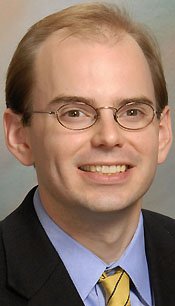Aug 4 2009
University of Kentucky electrical and computer engineering researcher J. Todd Hastings has won a two-year, $300,000 Young Faculty Award from the national Defense Advanced Research Projects Agency (DARPA).
 J. Todd Hastings
J. Todd Hastings
Hastings, an associate professor in the UK College of Engineering, received the grant for a project that has found a new way to rapidly-prototype nanometer scale devices and materials. This technique could greatly reduce the time and expense of making nanoscale products with applications ranging from computing to medical diagnostics.
The process uses electrons beamed through a liquid to deposit various materials, gold and platinum have already been demonstrated, onto a supporting object. The electron beam can be focused to a one nanometer spot, about 50,000 times smaller than a human hair, and the beam can "write" a nanoscale pattern in much the same way that one would write with ink on paper.
Hastings notes that other researchers have previously used electron beams to directly write nanoscale structures, but these approaches delivered the materials, the “ink,” in gases. These processes are limited with regard to the types of materials that can be written, the materials’ purity, and the writing speed. In contrast, writing in liquids promises rapid patterning of a wide range of high purity materials.
The approach also reduces the equipment and time required to make nanoscale devices, thereby accelerating the pace and increasing the economic feasibility of nanotechnology development, he said.
In addition to funding his research, the DARPA grant will allow Hastings to participate in visits and exercises at several Department of Defense facilities.